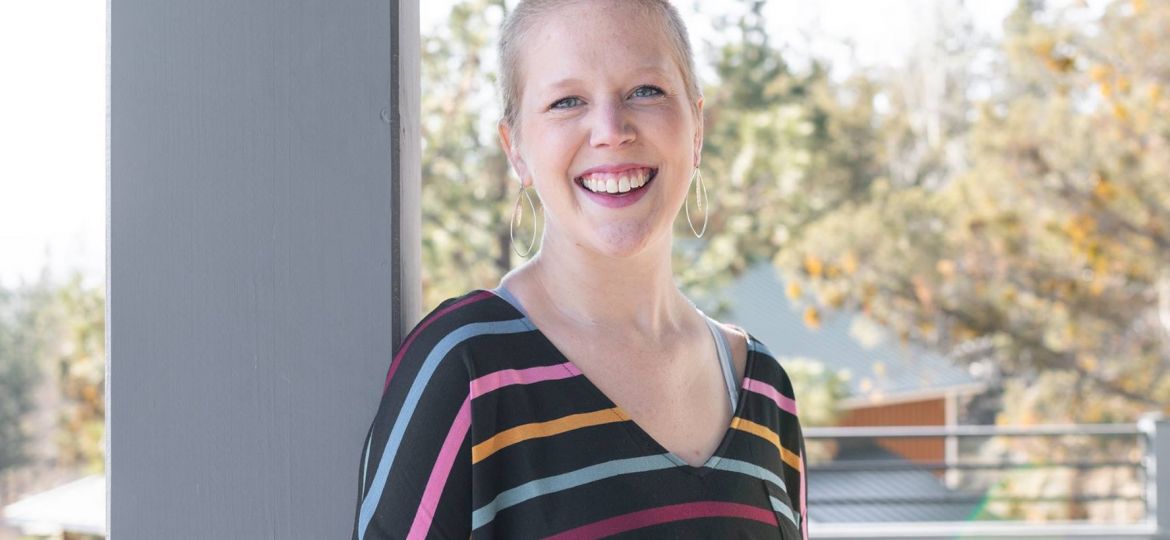
Rachel Peterson is one of my partners that I contract with. She is a whiz with digital marketing, but her story today is more important than any service she provides. I encourage you to listen not with pity, but with curiosity. -Sarah
My name is Rachel Peterson, and in February 2019 I was diagnosed with aggressive breast cancer at the age of 27. I’m a marathon and ultra runner, I treat my body like a temple (except for wine, that’s my weakness), and I have only one grandmother who had breast cancer. While I was planning many adventures in my life; going through chemo, a mastectomy, radiation and early menopause were not part of the equation. My guest writing is not about sympathy, or to shock you, or to go on a diatribe about our insurance system. Instead, it’s about how to handle grief. No, not your personal grief. But that awkward, sticky, makes you want to melt into the corner grief of your friend, loved one, or coworker.
Sarah recently shared with me a great article from the New York Times about what to say, and more importantly, what not to say to someone who’s grieving. And while it really resonated with me, especially with my new ‘circumstances’ (does anyone else hate that term when you’re dealing with life-altering news?!) It opened up a flood of times when I didn’t support those who were grieving, especially in the workplace. So, it’s my turn to eat a slice of humble pie!
The “Oh Yeah I’m going through something similar, too” mistake:
In all transparency, this mistake happened recently with my mother. She recently shared with me her struggles of sleepless nights, feeling guilt-ridden that her daughter had cancer and feeling quite lost. Instead of listening, letting her just be with his emotions, and offering a hand of support, my reply went something like…Oh my god, me too! I feel like I just can’t catch a break with everything and not being able to run as much as I want is such a detriment, etc, etc. My mom then had to shove her grief aside and comfort me. Not once did I ask what she needed, or how I could be there for her. It was my natural reaction to bring the attention to me. Wrong move!
I’ve experienced this frequently with my diagnosis. After telling a friend I was having a down day, she exclaimed she was experiencing similar feelings because her printer wasn’t working, her dog had peed on her carpet, and she was just “over” life. It might seem comically obvious this isn’t how we should respond, but more often than not, this is how I find myself reacting, so I can’t fault her!
The “I should just ignore my coworker for a few days until they’re fine” mistake:
In my early days of working in the real world, my manager had both of her parents pass away within one month of each other. She was stricken with grief, but still powered through work like a superhero. Her grief made me so uncomfortable that I just ignored it, and in turn, ignored her. In my mind it was better to do nothing and say nothing. But in reality, this strategy was selfish. If I didn’t confront her grief, it would make me feel more comfortable. I think sometimes saying the wrong thing is better than saying nothing at all.
The “Oh but you’ll learn so much from this” mistake:
Grief is grief. Grief sucks. Death sucks. And I don’t want to find a silver lining to my diagnosis right now. But alas, I readily thought of a time when I turned to a coworker and said those dreaded words, “It will all work out in the end.” Yes, it will work out…eventually. Yes, she survived her divorce and worked through the grief of this painful experience. But it took years. It took therapy. It took emotional breakdowns and financial turmoil. So, no, it didn’t immediately work out. And the lessons she learned were far down the road. I’m sure she’s still learning. Again, I didn’t let her just be with her emotions. I didn’t ask how I could help her. I didn’t sit in silence with her. I felt the need to say superficial phrases that were empty of help or meaning.
Ok, I’ve beat up on myself enough! Through all of this self-reflection, I did think of one good example, and I hope it’s a lesson in how simple acts of kindness and limiting my feelings or needs surrounding someone else’s grief was the right thing to do.
My coworker shared with me that she had a miscarriage the night before but she still came into work (a secondary lesson from this blog. Women are strong as hell.) She was overcome with emotion, embarrassed, lonely, and did not want to sit in her cubicle stifling tears. I pulled her into a private meeting room, and just sat with her. I didn’t say a word as she heaved tears of loss. I rubbed her back. I moved silently to the kitchen to make her a cup of tea. I sat with her for an hour and let her show her emotions. I limited my questions. I let her talk or cry or sit in silence as long as she wanted. The only words out of my mouth were: I’m here. Whatever you need, I’m here.
My biggest takeaway from this self-reflection, and from learning from Sarah, is to be hyper aware of your intention versus your impact in times of grief. Your words and intentions could save that person, or it could create a ripple effect of further grief.

